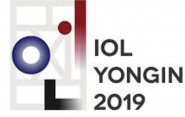
Members of the U.S. linguistics teams, coached by Yale’s Prof. Dragomir Radev, along with Lori Levin of Carnegie Mellon University and Aleka Blackwell of Middle Tennessee State University, took home seven individual medals, an honorable mention, and a best solution award at this year’s 2019 International Linguistics Olympiad (IOL) in Yongin, Republic of Korea.
The students were selected earlier this year at NACLO, the North American computational linguistics competition, in which high school students work on language-based puzzles that test their skills in logic, pattern recognition, analytical thinking, and problem solving. NACLO was co-founded in 2006 by Radev, the A. Bartlett Giamatti Professor of Computer Science. He also serves as the program chair and head coach.
Problem solving at the IOL - this year hosted in Yongin, South Korea - stresses the ability of contestants to decipher the mechanisms of languages by using logic and reasoning to explore a wide range of hypotheses.
The U.S. students were divided into two teams, USA Red and USA Blue. Wesley Zhang and Andrew Tockman, both of USA Red, earned gold medals. Silver medals went to Ziyan Lei and Russell Emerine of USA Red, and Skyelar Raiti, Jeremy Zhou, and Pranav Krishna of USA Blue. Katherine He of USA Blue received an honorable mention. Wesley Zhang was second overall in the individual contest with a score of 95.6 and one of three contestants awarded best solution to a problem. USA Red won the trophy for the highest score among the 53 teams participating.
Radev said he was proud of all the competitors, especially considering how much work they put into preparing for the competitions. That involved solving problems from previous NACLO and IOL competitions, lectures on various linguistic topics, and writing NACLO-style problems from scratch.
“We practiced for three months online, then in person in Seattle before leaving for South Korea,” Radev said.
The IOL consists of two events: the individual and the team contest. The individual contest is a six-hour exam with five problems. This year, the individual round featured the following languages and scripts: Yonggom, Yurok, Book Pahlavi script, West Tarangan, and Nooni. In the team contest, team members collaborate to solve one particularly challenging problem. This year, teams were given three hours to work out the rules of the notation system used by rhythmic gymnastics judges. Problem solving at the IOL stresses the ability of contestants to decipher the mechanisms of languages by using logic and reasoning to explore a wide range of hypotheses.
The 2020 IOL will be held in Ventspils, Latvia. Registration for NACLO starts on September 15, 2019. Go to the organization’s website to register.